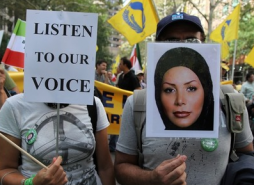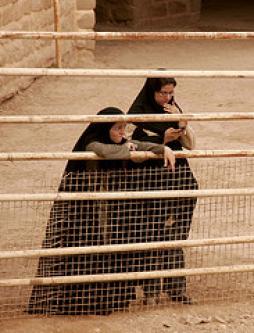iran
Posted by AnneryanHeatwole on Mar 11, 2010
A video filmed on a mobile phone made history when it won the George Polk Award for Journalism this year. Not only was it the first video to win in the newly-created videography category, it was also the first video in the Polk's 61-year history awarded to an anonymous citizen journalist.
The video shows the death of Neda Agha-Soltan, a young Iranian woman shot and killed during the protests in June 2009 following the Iranian elections. After the release of the video, news organizations around the world took note. Hundreds of thousands of viewers have seen the video of the young woman's death and it galvanized protests around the world. The press release from the Polk Awards describes the video:
| Anonymous Cell Phone Video from Iran Wins Journalism Award data sheet 7665 Views |
| Countries: |
Iran
|
Posted by PrabhasPokharel on Aug 17, 2009
The Role of New Media in the Iranian Elections data sheet 3060 Views
Author:
Center for International Media Assistance
Abstract:
New media technologies played a major role in the events leading up to and following the 2009 Iranian elections and are likely to continue to have a tremendous impact. Social networking tools such as Twitter, Facebook, and blogging have changed the way Iranian citizens communicate with each other as well as with the outside world. From cell phone cameras capturing scenes of violence that otherwise would go unreported to Twitter feeds used to organize massive protests, new media have forever changed the nature of citizen participation, not just in Iran, but throughout the world.
Despite the impact of these technologies during the Iranian elections, relatively little definitive information has been gathered about their specific role in the elections and subsequent protests. What are the implications of these new technologies for democracy in Iran? How have both the opposition and the government used these new tools against each other in what some call an “Internet battlefield”? Do the users of new media adequately represent the Iranian population? How has the Iranian government attempted to censor or curb the use of these new tools?
In presentations and discussions during a panel discussion held by the Center for International Media Assistance (CIMA), new media practitioners, Iran specialists, and interested observers attempted to clarify the role of new media in the Iranian elections and the implications of these technologies for future democratic movements.
Posted by KatrinVerclas on Nov 10, 2008
The National Council of Resistance of Iran reported recently that SMS use in Iran is now regulated. According to the article, the Organization of Communications Regulations in Iran has imposed restrictions on sending SMS, requiring a security check by the Ministry of Intelligence and Security (MOIS) to receive clearance for using the service.
The article details the regulation: "Sending SMS deemed contrary to national security will be punishable by law. Any change of address by the subscriber of the service must be reported promptly to the relevant authorities. It is the security agents who decide which SMS are in breach of national security." The article further states that "according to some figures every day over 20 million text messages are received in Iran, the peak hours are between ten in the evening and one in the morning. The SMS has become a tool to exchange messages by opponents of the regime."
Posted by CorinneRamey on Jan 23, 2008
Have you heard the joke about Iranian President Mahmoud Ahmadinejad? If you're a young person in Iran you probably have. Political jokes are spreading like wildfire in Iran, reports Parisa Dezfoulian in an article on texting in Iran in Middle East Online.
According to Desfoulian, SMS has become a way for young people to circumvent authority, largely through the spread of political jokes on subjects from nuclear energy to petrol bans to government rationing. She notes that with more than 20 million SMS messages sent every day in Iran,


